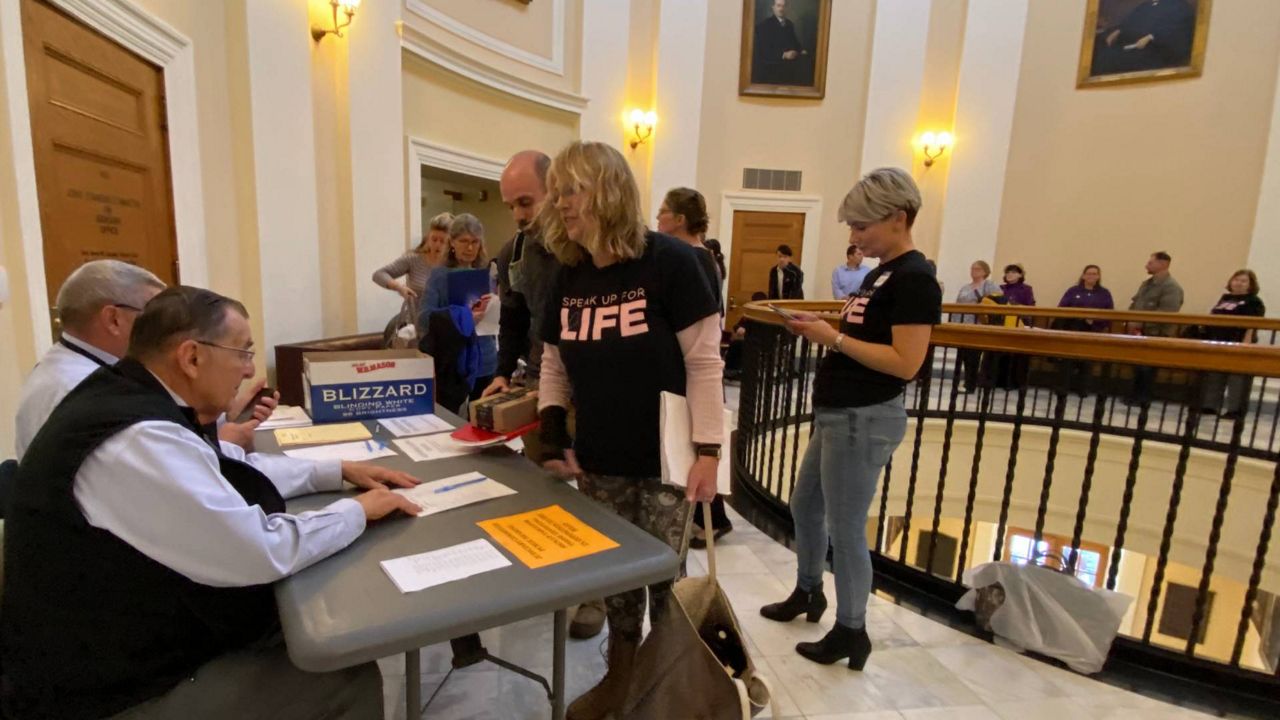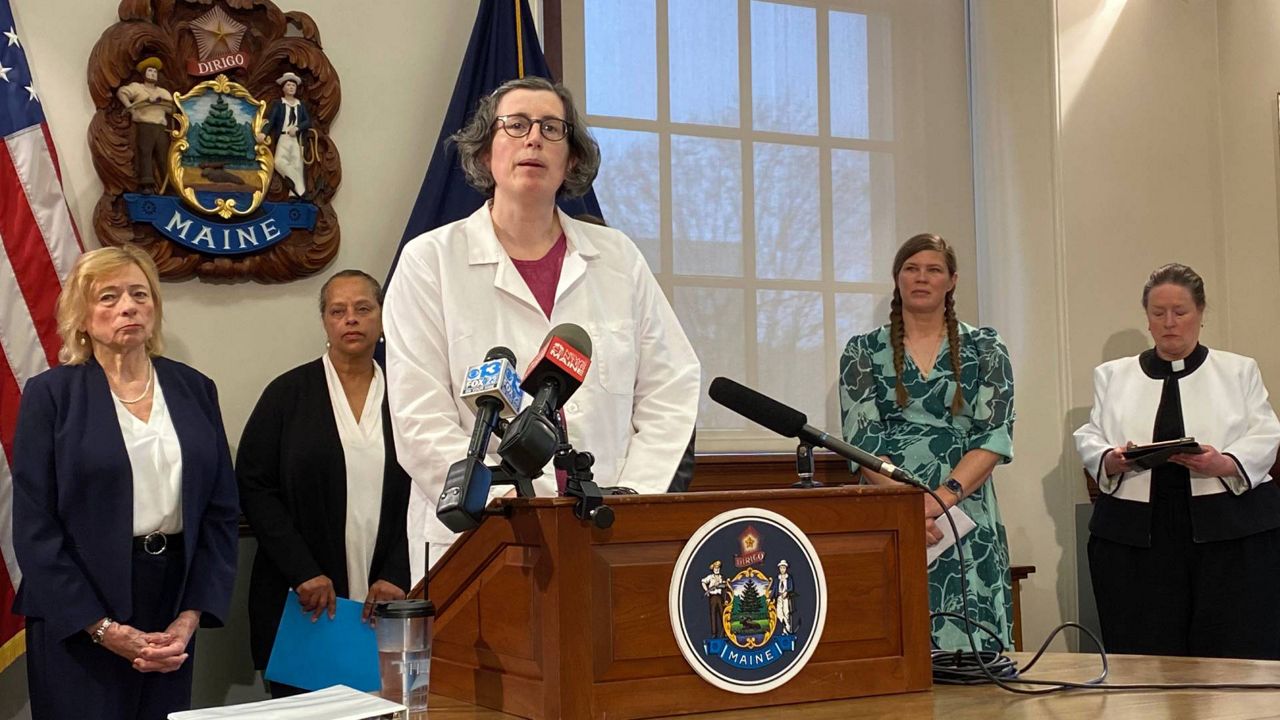For more than 17 years, Dr. Kathryn Sharpless has helped patients through birth, miscarriage and abortion.
The Portland obstetrician/gynecologist is supporting Gov. Janet Mills’ abortion expansion bill.
“My heart breaks every time I am forced to give pregnant people who need an abortion later in pregnancy a list of out-of-state providers because Maine’s current law bans it and includes criminal penalties,” she told lawmakers earlier this week.
Sharpless, other physicians and the Maine Medical Association are backing LD 1619, a bill put forward by Gov. Janet Mills to allow abortions past the point of viability, generally considered 24 weeks, if a doctor recommends the procedure.
Current law allows abortions after viability if it is necessary to preserve the life or health of the mother. The bill removes that language and instead would allow abortions after viability “only when it is necessary in the professional judgment of a physician.”
The bill also makes changes to the types of data that is collected when a woman gets an abortion and removes criminal penalties — though other penalties remain — for performing an abortion without being licensed to do so.
For 19 hours Monday into Tuesday, the Legislature’s Judiciary Committee took testimony on the measure, mostly from opponents. More than 2,500 people passed through security screening at the State House, an eye-popping number, even during the busiest time of the legislative session.

Above: Hundreds of abortion opponents waited in line for hours earlier this week to testify in opposition to a bill to allow abortion later in pregnancy. (Susan Cover/Spectrum News)
Maine Right to Life is leading the opposition, and for many, the bill presents an unacceptable expansion of abortion rights at a time when many states are limiting access to abortion.
Late Tuesday, Maine Republican Party Chairman Joel Stetkis, a former state lawmaker, urged opponents to keep the pressure on lawmakers to reject the bill.
“LD 1619 is a bad piece of legislation,” Stetkis wrote in an email. “It will move Maine into a place on abortion that most people never thought we would go (especially after Janet Mills promised she would not change Maine’s abortion laws). Tell your family and friends to contact their legislators, Democrat or Republican, and urge them to vote NO on this bill.”
Mills said she put forward the bill after hearing the story of a Yarmouth woman who had to travel out of state after finding out her 32-week-old baby had a rare and lethal condition.
Dana Peirce told reporters at a Monday news conference that she and her husband spent $25,000 to have the procedure in Colorado and that she came forward knowing that many other Maine women would not be able to afford to make the same decision.
She said the baby boy they had named Cameron was suffering.
“He faced death by suffocation if he survived delivery,” she said. “My strongest thoughts were I would not let my son suffer any longer than he already had.”
Mills laid out the reasons for the measure prior to Monday’s marathon hearing, saying limitations in current Maine law and the national landscape prompted her to act.
Just over a year ago, POLITICO first reported that leaked documents showed that the Supreme Court was on the verge of overturning Roe v. Wade, the 1973 landmark decision granting a federally protected right to an abortion.
A month later, the decision was released, sending the issue back to the states, where a patchwork of abortion regulations means most abortions are banned in 14 states, according to The New York Times.
Then last month, a Texas judge suspended the federal government’s approval of one of two drugs used in medication abortions. The Supreme Court later issued a stay in the case, meaning the drug remains available for now.
In Maine, Mills is also making a political calculation by putting forward the abortion expansion bill now.
Democrats control the House and Senate and Mills, a fellow Democrat, said she is poised to sign the legislation if it makes it to her desk. More than 90 Democrats signed on to the bill, which is sponsored by the two most powerful people in the Legislature — House Speaker Rachel Talbot Ross of Portland and Senate President Troy Jackson of Allagash.
Republicans appear united in their opposition, but Democratic majorities mean they wield little power to stop the bill.
And while Mills will serve as governor until January 2027, the make-up of the Legislature — or even just one chamber — could flip in November 2024, virtually eliminating any opportunity Mills would have to make these kinds of changes in abortion law.
Mills said nearly one-in-three women across the U.S. no longer have access to safe abortion care, describing that as “cruel, callous, inhumane.”
“It is in many cases extremely serious and a heartbreaking decision made by women in consultation with their trusted physician in the privacy of a doctor’s office,” Mills said. “Not in the halls of this Legislature, not in the halls of the U.S. Supreme Court, but in the privacy of a doctor’s office without some person in a black robe or a person in the Legislature invading the privacy, intruding upon that woman making that choice.”





